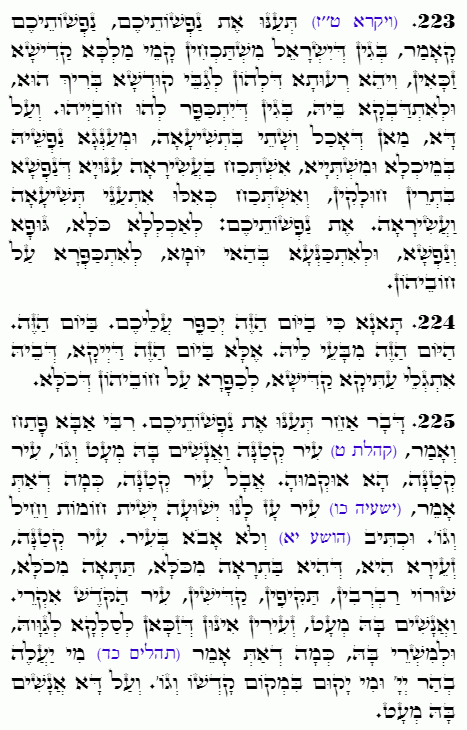Daily Zohar # 4649 – Acharei Mot – A small city on the mountain of YHVH
Daily Zohar 4649

Hebrew translation:
224. לָמַדְנוּ, כִּי בַיּוֹם הַזֶּה יְכַפֵּר עֲלֵיכֶם. בַּיּוֹם הַזֶּה?! הַיּוֹם הַזֶּה הָיָה צָרִיךְ לִהְיוֹת! אֶלָּא בַּיּוֹם הַזֶּה דַּוְקָא, שֶׁבּוֹ מִתְגַּלֶּה הָעַתִּיק הַקָּדוֹשׁ לְכַפֵּר עַל חֲטָאֵי כֻּלָּם.
225. דָּבָר אַחֵר תְּעַנּוּ אֶת נַפְשֹׁתֵיכֶם – רַבִּי אַבָּא פָּתַח וְאָמַר, (קהלת ט) עִיר קְטַנָּה וַאֲנָשִׁים בָּהּ מְעָט וְגוֹ’. עִיר קְטַנָּה, הֲרֵי פֵּרְשׁוּהָ. אֲבָל עִיר קְטַנָּה, כְּמוֹ שֶׁנֶּאֱמַר (ישעיה כו) עִיר עָז לָנוּ יְשׁוּעָה יָשִׁית חוֹמוֹת וָחֵל וְגוֹ’. וְכָתוּב (הושע יא) וְלֹא אָבוֹא בְּעִיר. עִיר קְטַנָּה, קְטַנָּה הִיא, שֶׁהִיא אַחֲרוֹנָה מֵהַכֹּל וְתַחְתּוֹנָה מֵהַכֹּל. חוֹמוֹתֶיהָ גְּדוֹלוֹת, חֲזָקוֹת, קְדוֹשׁוֹת, נִקְרֵאת עִיר הַקֹּדֶשׁ. וַאֲנָשִׁים בָּהּ מְעָט, מְעַטִּים אוֹתָם שֶׁזּוֹכִים לִכָּנֵס לְתוֹכָהּ וְלִשְׁרוֹת בָּהּ, כְּמוֹ שֶׁנֶּאֱמַר (תהלים כד) מִי יַעֲלֶה בְהַר ה’ וּמִי יָקוּם בִּמְקוֹם קָדְשׁוֹ וְגוֹ’. וְעַל זֶה אֲנָשִׁים בָּהּ מְעָט.
.
Zohar Acharei Mot
Continued from previous DZ
#223
“תְּעַנּוּ אֶת נַפְשֹׁתֵיכֶם” “Afflict your souls” (Leviticus 16:29)—The term “נַפְשֹׁתֵיכֶם” “your souls” is used so that Israel may be found righteous before the Holy King, directing their will towards the Holy One, Blessed be He, and cleaving to Him, so that their sins may be cleansed. Therefore, one who eats and drinks on the ninth (of Tishrei) and enjoys their soul with food and drink will find their soul afflicted on the tenth (Yom Kippur), doubly so. It is considered as if they have fasted on both the ninth and the tenth. “נַפְשֹׁתֵיכֶם” “Your souls” includes everything—body and soul—so that one should humble themselves on this day to atone for their sins.
Notes:
This Zohar explains the significance of fasting on Yom Kippur, the Day of Atonement. The phrase “afflict your souls” is interpreted to mean that the fasting and humility practiced on Yom Kippur are meant to align the will of the people of Israel with Hashem’s will, leading to the forgiveness of sins. By enjoying food and drink on the day before Yom Kippur, one prepares oneself for the fast in such a way that the affliction of the soul on Yom Kippur is intensified, effectively making it as if one has fasted for two days.
#224
We have learned that “כִּי בַיּוֹם הַזֶּה יְכַפֵּר עֲלֵיכֶם” “on this day He will atone for you.” It asks why it says “on this day” rather than just “this day”. The answer is that the phrase “on this day” is precise because on this day, Atika Kadisha, which is the higher level of Keter, is revealed to atone for everyone’s sins.
Notes:
“Atika Kadisha,” or the “Holy Ancient One,” which corresponds to the Sefira of Keter, is revealed to tell us that Hashem is directly involved in the process of atonement on Yom Kippur. The Zohar teaches that Yom Kippur is not just a day of repentance but a day when the highest level of mercy and cleansing is accessible, allowing for the complete atonement of sins.
#225
Ecclesiastes 9:14
“עִיר קְטַנָּה וַאֲנָשִׁים בָּהּ מְעָט וּבָא אֵלֶיהָ מֶלֶךְ גָּדוֹל וְסָבַב אֹתָהּ וּבָנָה עָלֶיהָ מְצוֹדִים גְּדֹלִים.”
“There was a small city with few men in it, and a great king came against it, besieged it, and built great snares around it.”
Rabbi Abba began and said: The phrase “a small city” has already been explained. However, “a small city” can be understood like the verse.
Isaiah 26:1
“בַּיּוֹם הַהוּא יוּשַׁר הַשִּׁיר הַזֶּה בְּאֶרֶץ יְהוּדָה עִיר עָז לָנוּ יְשׁוּעָה יָשִׁית חוֹמוֹת וָחֵל.”
“In that day this song will be sung in the land of Judah: “We have a strong city; God will appoint salvation for walls and bulwarks.”
It is also written, “וְלֹא אָבוֹא בְּעִיר” “But I will not enter the city,” where the city represents the Malchut. The “small city” is small because it is the last and lowest of all the Sefirot. Its walls are great, strong, and holy, and it is called the Holy City. “A small city with few men in it” —those who merit to ascend into it and dwell within it are few, as it is written,
Psalm 24:3
“מִי יַעֲלֶה בְהַר יְהוָה וּמִי יָקוּם בִּמְקוֹם קָדְשׁוֹ.”
“Who shall ascend into the mountain of YHVH? And who shall stand in His holy place?”
Therefore, it says, “The people in it are few.”
Notes:
A “small city” represents Malchut, the lowest Sefira. Despite being the lowest, Malchut is described as having strong and holy walls, symbolizing spiritual strength and sanctity. Only a few, the truly righteous, are able to ascend into the spiritual state represented by the city. This aligns with the idea that spiritual elevation and closeness to Hashem are accessible to only a select few who are pure and righteous.
{||}

 Previous: Acharei Mot
Previous: Acharei Mot

